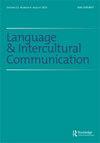提高语言教师的跨文化教学技能:协作反思的作用
IF 2.2
1区 文学
0 LANGUAGE & LINGUISTICS
引用次数: 0
摘要
摘要本研究探讨合作反思对伊朗英语教师跨文化教学实践的影响。通过观察4名新教师和有经验的教师在8次CR课程前后的课堂教学情况来收集数据。结果显示,文化交流是提高教师ICC技能和实践的有效工具,因为它使他们能够注意到课程中的文化情节,并根据从文化交流中学到的原则和模式富有成效地教授ICC。然而,尽管文化交流对所有教师都有益,但新手从文化交流课程中获益更多。这个练习曲检查les运用de la反射协作(RC)在实际pedagogique interculturelle des离d 'anglais iraniens。不合格的薪金和不合格的薪金和不合格的薪金和不合格的薪金和不合格的薪金和不合格的薪金和不合格的薪金和不合格的薪金和不合格的薪金。将交换交换交换交换交换交换交换交换交换交换交换交换交换交换交换交换交换交换交换交换交换交换交换交换交换交换交换交换交换交换交换交换交换交换交换交换交换交换交换交换交换交换交换交换交换交换交换交换交换交换交换交换交换交换交换交换交换交换交换交换交换交换交换交换交换交换交换交换交换交换交换交换交换交换交换交换交换交换交换交换交换交换交换交换交换交换交换交换交换交换交换交换交换交换交换交换交换交换交换交换交换交换交换交换交换交换交换交换交换交换交换交换交换交换交换交换交换交换交换交换交换交换交换交换交换交换交换交换交换交换交换交换交换交换交换交换交换交换交换交换交换交换交换交换交换交换交换交换交换交换交换交换交换交换交换交换交换交换交换交换交换交换交换交换交换交换交换交换交换交换交换交换交换交换交换交换Neanmoins, meme si RC疾病benefique倒enseignants分为满分,里面的新手轮胎davantage des通灵de la RC。关键词:第二语言教师跨文化交际能力跨文化实践协作反思教师反思披露声明作者未报告潜在利益冲突。作者简介:zia Tajeddin,伊朗Tarbiat Modares大学应用语言学教授。他的主要研究领域包括教师教育、跨文化语言教育和第二语言语用学。他与托马斯·法雷尔(Thomas Farrell)共同编辑了Springer出版的《语言教师教育研究》系列丛书。他参与编辑了两本国际期刊:《应用语用学》(John Benjamins)和《第二语言教师教育》(Equinox)。他在《语言测试》、《语言、身份与教育杂志》、《国际应用语言学杂志》、《澳大利亚教师教育杂志》、《语言学习杂志》、《语言与跨文化交际》等刊物上发表过研究成果。他是《优秀语言教师的教训》(剑桥大学出版社,2020年)、《英语作为国际语言的语用教育学》(劳特利奇出版社,2021年)、《教师反思:政策、实践和影响》(多语言问题,2022年)和《语言教育计划:政策和实践的视角》(施普林格出版社,2023年)的共同编辑。Zari Saeedi博士毕业于英国三一学院,现为伊朗阿拉梅塔巴塔巴大学副教授。她在不同的大学教授各种学士、硕士和博士课程,参加不同的国家/国际会议,在一系列主题上发表/发表论文/书籍,包括教育神经/心理语言学和大脑功能,认知语言学习,特别是基于大脑的语言学习(BBLL),文化,技术辅助语言学习,以及语言学的角色和参考语法理论。她最近在John Benjamins和Equinox出版物上发表了论文和书籍。她最近的出版物是关于计算机辅助语言学习的虚拟教育词典。Neda Khanlarzadeh,伊朗阿拉梅塔巴塔巴大学应用语言学博士研究生。她的研究领域包括语篇研究、第二语言语用学和(跨文化)教师教育。她目前在德黑兰阿拉梅大学和英语语言学院教授英语课程。她在《伊朗语言教学研究杂志》、《英语语言应用研究》和《语言学习与教学创新》等国内和国际期刊上发表过书籍章节、书评和论文。本文章由计算机程序翻译,如有差异,请以英文原文为准。
Enhancing language teachers’ skills for intercultural instruction: affordance of collaborative reflection
ABSTRACTThis study investigated the effects of collaborative reflection (CR) on Iranian English language teachers’ intercultural instructional practice. The data were gathered by observing the classroom instruction of four novice and experienced teachers before and after eight CR sessions. The result revealed that CR was an effective tool for improving teachers’ ICC skills and practice as it enabled them to notice cultural episodes of the lessons and teach ICC productively based on the principles and models learned from CR. Nonetheless, although CR was beneficial for all teachers, the novice ones took more advantages from the CR sessions.Cette étude a examiné les effets de la réflexion collaborative (RC) sur la pratique pédagogique interculturelle des professeurs d'anglais iraniens. Les données ont été recueillies en observant l'enseignement en classe de quatre enseignants novices et expérimentés avant et après huit séances de la RC. Le résultat a révélé que la RC était un outil efficace pour améliorer les compétences et la pratique de la compétence communicative interculturelle (CCI) des enseignants, car elle leur permettait de remarquer les épisodes culturels des leçons et d'enseigner la CCI de manière productive sur la base des principes et des modèles appris de la RC. Néanmoins, même si la RC a été bénéfique pour tous les enseignants, les novices ont tiré davantage parti des séances de la RC.KEYWORDS: L2 teachersintercultural communicative competence (ICC)intercultural practicecollaborative reflection (CR)teachers’ reflection Disclosure statementNo potential conflict of interest was reported by the author(s).Additional informationNotes on contributorsZia TajeddinZia Tajeddin is Professor of Applied Linguistics at Tarbiat Modares University, Iran. His main areas of research include teacher education, intercultural language education, and L2 pragmatics. He serves as the editor (with Thomas Farrell) of the Springer book series Studies in Language Teacher Education. He co-edits two international journals: Applied Pragmatics (John Benjamins) and Second Language Teacher Education (Equinox). He has published his studies in Language Testing, Journal of Language, Identity, and Education, International Journal of Applied Linguistics, Australian Journal of Teacher Education, The Language Learning Journal, and Language and Intercultural Communication, among others. He is the co-editor of Lessons from Good Language Teachers (Cambridge University Press, 2020), Pragmatics Pedagogy in English as an International Language (Routledge, 2021), Teacher Reflection: Policies, Practices and Impacts (Multilingual Matters, 2022), and Language Education Programs: Perspectives on Policies and Practics (Springer, 2023).Zari SaeediZari Saeedi received her Ph.D. from the British University of Trinity College and is an Associate Professor of Allameh Tabataba’i University, Iran. She has taught various B.A., M.A., and Ph.D. courses in different universities, taking part in different national/international conferences, presenting/publishing papers/books on a range of topics including educational neuro/psycholinguistics and brain functioning, cognitive language learning and in particular, brain-based language learning (BBLL), culture, technology-assisted language learning, and Role and Reference Grammar Theory of linguistics. Her published paper and book in John Benjamins and Equinox publications are among the recent ones. Her most recent publication is the dictionary of virtual education with a focus on computer assisted language learning.Neda KhanlarzadehNeda Khanlarzadeh is a Ph.D. candidate in Applied Linguistics at Allameh Tabataba'i University, Iran. Her areas of interest are discourse studies, second language pragmatics, and (intercultural) teacher education. She is currently teaching English courses at Allameh Tabataba'i University and English language institutes in Tehran. She has published book chapters, book reviews, and papers in national and international journals, including Iranian Journal of Language Teaching Research, Applied Research on English Language, and Innovation in Language Learning and Teaching.
求助全文
通过发布文献求助,成功后即可免费获取论文全文。
去求助
来源期刊

Language and Intercultural Communication
Multiple-
CiteScore
3.00
自引率
47.40%
发文量
50
期刊介绍:
Language & Intercultural Communication promotes an interdisciplinary understanding of the interplay between language and intercultural communication. It therefore welcomes research into intercultural communication, particularly where it explores the importance of linguistic aspects; and research into language, especially the learning of foreign languages, where it explores the importance of intercultural perspectives. The journal is alert to the implications for education, especially higher education, and for language learning and teaching. It is also receptive to research on the frontiers between languages and cultures, and on the implications of linguistic and intercultural issues for the world of work.
 求助内容:
求助内容: 应助结果提醒方式:
应助结果提醒方式:


